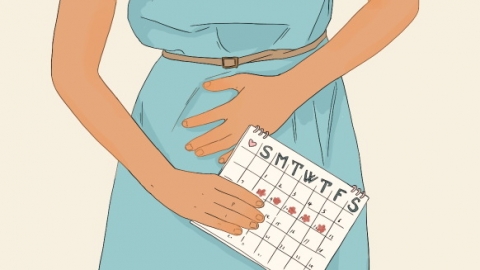It's been almost a year since my D&C, but my menstrual flow has been very light. What could be causing this, and what should I do?
"Da Yi Ma" usually refers to menstruation. In general, if menstrual flow has been light for nearly a year after a dilation and curettage (D&C) procedure, it may be due to excessive mental stress, inadequate nutrition, thin endometrium, intrauterine adhesions (Asherman's syndrome), or endocrine disorders. It is recommended to seek medical attention promptly, identify the underlying cause, and follow a doctor’s guidance for improvement through lifestyle adjustments, medication, or other treatments. Specific causes are analyzed as follows:

1. Excessive mental stress: Long-term anxiety and tension can lead to neuroendocrine disturbances, affecting hormone secretion and resulting in reduced menstrual flow. Maintain a regular sleep schedule, avoid staying up late, engage in about 30 minutes of aerobic exercise daily—such as yoga or jogging—and relieve stress through listening to music or communicating with family and friends to improve emotional well-being.
2. Inadequate nutritional intake: Excessive dieting or picky eating after surgery may lead to deficiencies in protein, iron, and other nutrients, impairing endometrial repair. Adjust your diet by consuming more nutrient-rich foods such as lean meat, eggs, and spinach, ensure balanced daily nutrition, and avoid extreme dieting for weight loss.
3. Thin endometrium: D&C can damage the basal layer of the endometrium, leading to insufficient endometrial proliferation and decreased menstrual flow. Follow your doctor’s instructions to use medications such as estradiol valerate tablets, conjugated estrogens tablets, or estradiol drospirenone tablets to promote endometrial repair and thickening.
4. Intrauterine adhesions: D&C may cause injury and adhesion of the uterine lining, obstructing menstrual blood flow and leading to scanty periods or even amenorrhea. Hysteroscopic adhesiolysis is required to separate the adhesions. After surgery, an intrauterine device (IUD) may be placed or medications used to prevent recurrence of adhesions.
5. Endocrine imbalance: D&C may affect ovarian function, causing abnormal secretion of estrogen and progesterone, which leads to reduced menstrual flow. Under medical supervision, medications such as progesterone capsules, dydrogesterone tablets, or ethinylestradiol cyproterone acetate tablets may be used to regulate hormone levels and restore a normal menstrual cycle.
In daily life, keep the abdomen warm and avoid cold exposure. Avoid strenuous exercise and heavy physical labor during menstruation, and maintain good external genital hygiene. A regular lifestyle, balanced diet, and proper care can help restore normal menstrual function.








